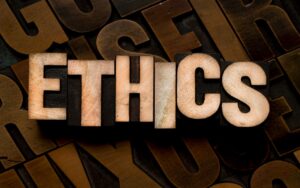
Ethical Wealth Creation: Balancing Success and Integrity in Business

Introduction
Any great business is built on personal integrity and fundamental principles. Integrity in entrepreneurship plays a crucial role as every successful business relies on guiding principles that shape corporate culture, influence decision-making, and ultimately define the organization’s reputation. Leaders and entrepreneurs who prioritize honesty and basic principles lead by example, fostering an ethical culture in the workplace. It might be easy to prioritize success and profit over morality and ethics in today’s fast-paced, cutthroat corporate world. However, as history has often demonstrated, companies founded on dubious moral principles are unlikely to survive over time. Upholding integrity in entrepreneurship becomes a moral imperative and a strategic foundation for sustainable success.
Balancing success and integrity in business development is crucial. Encouraging our moral compass and personal integrity gives our organizations a solid foundation, fostering responsibility and openness. This balance is critical to setting us up for long-term success in the dynamic business development landscape.
Ready to redefine prosperity? Start reading ‘Career Mastery Blueprint: Strategies for Success in Work and Business’ by VERSAtile Reads today!
What Are Ethical Business Practices?
An organization’s ethical behavior and decision-making are based on principles and values. These ideals include dedication to honesty, justice, openness, respect for stakeholders, and social and environmental responsibility. Following these moral guidelines becomes crucial while operating a well-known and sustained firm. Maintaining these principles helps the business succeed in the long run and has a good effect on society and guiding its activities. Businesses that include ethical issues in their fundamental values build credibility, trust, and a reputation for ethical and responsible behavior.
Importance of Ethical Culture in an Organization
An ethical culture is essential to a thriving organization because it fosters stakeholder trust and is a cornerstone for improving employee morale, reducing legal risks, luring top talent, and fostering innovation. This joint synergy, crucial for sustainable wealth creation, accelerates the organization’s long-term development and profitability. Businesses that value moral conduct provide an atmosphere where people may succeed personally and professionally. An organization’s vivacious and durable identity is shaped by its unshakable commitment to ethics, which acts as a catalyst and lays the groundwork for long-term success.
Business Integrity Principles
-
Building Trust and Reputation:
Profitability and ethics are not two different things; instead, they are deeply entwined. A company that upholds integrity in its operations gains the respect of its stakeholders—including workers and customers—and forges solid bonds with suppliers, investors, and partners. Responsible business growth, rooted in ethical practices, becomes a linchpin in building and sustaining these relationships. Trust, founded on moral behavior, becomes an invaluable resource in business, functioning as a medium of exchange that improves the company’s overall image and cultivates long-lasting connections supporting ongoing revenue. But, acting ethically is the right thing to do and a strategic move that opens the door to responsible business growth, long-term prosperity, and financial stability.
-
Increasing Customer Loyalty:
Customer loyalty is significantly impacted by ethical company practices, mainly as customers grow more aware of the social and environmental effects of the products they buy. Businesses that genuinely embrace ethical business practices and share the beliefs of their clientele may become memorable, win over devoted patrons, and encourage brand advocacy. Moreover, the alignment of corporate ethics and culture is critical in the field of talent acquisition. In today’s labour market, potential workers give preference to companies that share their values and have a beneficial impact on society. Businesses may draw in and keep top talent by upholding ethical standards; these are people who are inspired by a higher purpose in addition to financial gain. Workers who support the moral goals of the organization.
-
Risk reduction and legal ramifications:
Being ethical keeps one safe from future legal issues and reputational harm. A company’s bottom line might be negatively impacted by costly lawsuits, regulatory scrutiny, and legal ramifications resulting from unethical behavior. Companies that respect moral standards lower their risk of legal issues, protect their standing as trustworthy suppliers of goods and services, and save money.
Ethical business practices promote creativity and flexibility. In ethical organizations, diversity, inclusion, and collaboration are more likely to be highly appreciated since they facilitate the exchange of ideas and encourage innovation. By promoting an ethical culture, businesses may inspire their staff to question the status quo, think outside the box, and find innovative solutions to complex problems. In an ever-evolving corporate environment, this fosters flexibility and a competitive advantage.
-
Sustainable Wealth Creation:
Ethics and sustainability are mutually beneficial to an organization’s long-term survival. Businesses may increase their long-term sustainability by implementing environmentally friendly practices, actively participating in local communities, and ensuring their employees are treated fairly. Adopting and upholding these moral values draws like-minded clients and encourages partnerships with other morally-driven businesses. Sustainable business methods frequently result in cost savings, improved operational efficiency, and favorable environmental effects in addition to improving a company’s reputation. Incorporating sustainable and ethical practices into the heart of corporate operations is not only a strategic need for environmental responsibility and economic success, but it also coincides with the ideals of ethical customers.

-
Balancing Success and Integrity in Business Development:
It is not necessary to compromise moral principles to achieve business success. Instead, firms may prosper by emphasizing openness in their code of ethics, treating employees fairly, and building enduring mutually beneficial partnerships. Setting these principles as a high priority not only helps to recruit top personnel and creates a solid platform for sustained growth, but it also helps to build trust with stakeholders. This strategy emphasizes that ethical business practices are not just a moral need but also a calculated decision for long-term success and a good influence on the company and society. It also shows that prosperity and integrity can coexist peacefully. Companies that respect moral principles help create a more moral and sustainable business environment and are a significant factor in their success.
Conclusion
In today’s dynamic business landscape, navigating the path to success often feels like a tightrope walk. The pressure to prioritize short-term gains can be immense, tempting companies to stray from ethical principles. However, this blog has demonstrated that integrity and prosperity are not mutually exclusive. By fostering a culture of ethical conduct, businesses can unlock many benefits, from cultivating loyal customers and attracting top talent to minimizing legal risks and achieving sustainable growth. Ultimately, choosing the ethical path is not just the right thing to do; it’s a strategic decision that paves the way for long-term success and a lasting positive impact on the world. Building a thriving business goes beyond the bottom line; it’s about building a legacy of integrity and leaving a positive mark on the world around you.
FAQS
Question: What distinguishes integrity from honesty?
While honesty involves truthfulness and transparency, integrity goes further, encompassing consistency in moral principles and aligning actions with a set of values.
Question: How can one demonstrate integrity in the workplace?
Demonstrating workplace integrity involves consistent adherence to ethical principles, transparent communication, accountability, respectful treatment of others, adherence to policies, and fair conflict resolution.
Question: What does Corporate Social Responsibility (CSR) entail?
CSR involves a company’s commitment to ethical operations, positive societal contributions, environmental responsibility, social impact, ethical business practices, employee welfare, consumer protection, and stakeholder engagement. It signifies a dedication to broader societal and environmental well-being beyond profit-making.
- Published Date:



